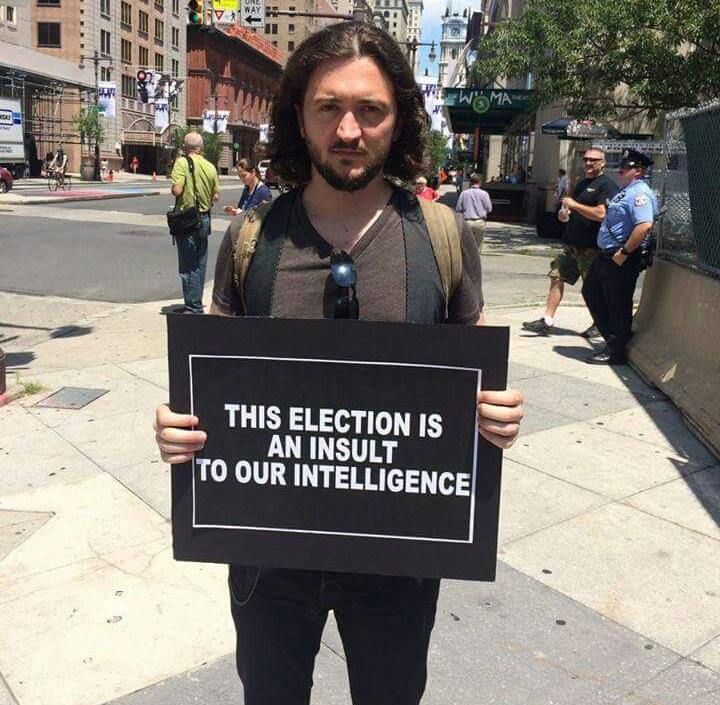From an interview with David Gelernter via a link from Clayton Cramer’s blog
GELERNTER: I’m a teacher of college students. I’m lucky to be at one of the best colleges in the world, at Yale. Our students are as smart as any in the world. They work very hard to get here. They are eager, they’re likable. My generation is getting a chip on its shoulder, we always thought we knew everything about every topic, our professors were morons, and we were the ones who were building the world.
My students today are much less obnoxious. Much more likable than I and my friends used to be, but they are so ignorant that it’s hard to accept how ignorant they are. You tell yourself stories; it’s very hard to grasp that the person you’re talking to, who is bright, articulate, advisable, interested, and doesn’t know who Beethoven is. Had no view looking back at the history of the 20th century – just sees a fog. A blank. Has the vaguest idea of who Winston Churchill was or why he mattered. And maybe has no image of Teddy Roosevelt, let’s say, at all. I mean, these are people who – We have failed.
—
(H)ow did we get to this point today when my students know nothing?
They know nothing about art. They know nothing about history. They know nothing about philosophy. And because they have been raised as not even atheists, they don’t rise to the level of atheists, insofar as they’ve never thought about the existence or nonexistence of God. It has never occurred to them. They know nothing about the Bible. They’ve never opened it. They’ve been taught it’s some sort of weird toxic thing, especially the Hebrew Bible, full of all sorts of terrible, murderous, prejudiced, bigoted. They’ve never read it. They have no concept.
It used to be, if I turned back to the 1960s to my childhood, that at least people have heard of Isaiah. People had heard of the Psalms. They had some notion of Hebrew poetry, having created the poetry of the Western world. They had some notion of the great prophets having created our notions of justice and honesty and fairness in society
But these children not only ignorant of everything in the intellectual realm, they have been raised ignorant in the spiritual world. They don’t go to church. They don’t go to synagogue. They have no contact – the Americans. Some of the Asians are different. Some of the Asians – and, of course, the Asians play a larger and larger role. But I think, from what I can tell, the Asians are moving in an American direction, and they’re pulling up their own religious roots.
But when I see a bright, young Yale student who has been reared not as Jew, not as a Christian, outside of any religious tradition, why should he tell the truth? Why should he not lie? Why should he be fair and straightforward in his dealings with his fellow students? He has sort of an idea that’s the way he should be, but why? If you challenge him, he doesn’t know. And he’ll say, “Well, it’s just my view.” And I mean, after all everybody has his own view.
KRISTOL: So we began in the 50s, and now we’re 60 years later. How did this, what were the big break points in your judgment from “Serious America” to America-Lite?
GELERNTER: It seems to me something happened. There was a historical event, which needs to be understood and recognized more clearly than it is. The cultural revolution in the United States, which people take for granted. If I tell people there was a cultural revolution, yeah sure, there were a lot of changes in the 60s. But it’s more than that. It’s a double change.
Colleges and universities. Let’s look at the generation after the Second World War. This is a cultural revolution, it seems to me to extend roughly from 1945 to 1970. So in 1970 everything is different. Things are radically different. And what happened during those 25 years? Colleges and universities became vastly, vastly more influential on American culture.
Remember the words of John Taylor Gatto:
In the first decades of the twentieth century, a small group of soon-to-be-famous academics, symbolically led by John Dewey and Edward Thorndike of Columbia Teachers College, Ellwood P. Cubberley of Stanford, G. Stanley Hall of Clark, and an ambitious handful of others, energized and financed by major corporate and financial allies like Morgan, Astor, Whitney, Carnegie, and Rockefeller, decided to bend government schooling to the service of business and the political state—as it had been done a century before in Prussia.
Cubberley delicately voiced what was happening this way: “The nature of the national need must determine the character of the education provided.” National need, of course, depends upon point of view. The NEA in 1930 sharpened our understanding by specifying in a resolution of its Department of Superintendence that what school served was an “effective use of capital” through which our “unprecedented wealth-producing power has been gained.” When you look beyond the rhetoric of Left and Right, pronouncements like this mark the degree to which the organs of schooling had been transplanted into the corporate body of the new economy.
It’s important to keep in mind that no harm was meant by any designers or managers of this great project. It was only the law of nature as they perceived it, working progressively as capitalism itself did for the ultimate good of all. The real force behind school effort came from true believers of many persuasions, linked together mainly by their belief that family and church were retrograde institutions standing in the way of progress. Far beyond the myriad practical details and economic considerations there existed a kind of grail-quest, an idea capable of catching the imagination of dreamers and firing the blood of zealots.
and
At the start of WWII millions of men showed up at registration offices to take low-level academic tests before being inducted. The years of maximum mobilization were 1942 to1944; the fighting force had been mostly schooled in the 1930s, both those inducted and those turned away. Of the 18 million men were tested, 17,280,000 of them were judged to have the minimum competence in reading required to be a soldier, a 96 percent literacy rate. Although this was a 2 percent fall-off from the 98 percent rate among voluntary military applicants ten years earlier, the dip was so small it didn’t worry anybody.
WWII was over in 1945. Six years later another war began in Korea. Several million men were tested for military service but this time 600,000 were rejected. Literacy in the draft pool had dropped to 81 percent, even though all that was needed to classify a soldier as literate was fourth- grade reading proficiency. In the few short years from the beginning of WWII to Korea, a terrifying problem of adult illiteracy had appeared. The Korean War group received most of its schooling in the 1940s, and it had more years in school with more professionally trained personnel and more scientifically selected textbooks than the WWII men, yet it could not read, write, count, speak, or think as well as the earlier, less-schooled contingent.
A third American war began in the mid-1960s. By its end in 1973 the number of men found noninductible by reason of inability to read safety instructions, interpret road signs, decipher orders, and so on—in other words, the number found illiterate—had reached 27 percent of the total pool. Vietnam-era young men had been schooled in the 1950s and the 1960s—much better schooled than either of the two earlier groups—but the 4 percent illiteracy of 1941 which had transmuted into the 19 percent illiteracy of 1952 had now had grown into the 27 percent illiteracy of 1970. Not only had the fraction of competent readers dropped to 73 percent but a substantial chunk of even those were only barely adequate; they could not keep abreast of developments by reading a newspaper, they could not read for pleasure, they could not sustain a thought or an argument, they could not write well enough to manage their own affairs without assistance.
Consider how much more compelling this steady progression of intellectual blindness is when we track it through army admissions tests rather than college admissions scores and standardized reading tests, which inflate apparent proficiency by frequently changing the way the tests are scored.
—
Back in 1952 the Army quietly began hiring hundreds of psychologists to find out how 600,000 high school graduates had successfully faked illiteracy. Regna Wood sums up the episode this way:
After the psychologists told the officers that the graduates weren’t faking, Defense Department administrators knew that something terrible had happened in grade school reading instruction. And they knew it had started in the thirties. Why they remained silent, no one knows. The switch back to reading instruction that worked for everyone should have been made then. But it wasn’t.
In 1882, fifth graders read these authors in their Appleton School Reader: William Shakespeare, Henry Thoreau, George Washington, Sir Walter Scott, Mark Twain, Benjamin Franklin, Oliver Wendell Holmes, John Bunyan, Daniel Webster, Samuel Johnson, Lewis Carroll, Thomas Jefferson, Ralph Waldo Emerson, and others like them. In 1995, a student teacher of fifth graders in Minneapolis wrote to the local newspaper, “I was told children are not to be expected to spell the following words correctly: back, big, call, came, can, day, did, dog, down, get, good, have, he, home, if, in, is, it, like, little, man, morning, mother, my, night, off, out, over, people, play, ran, said, saw, she, some, soon, their, them, there, time, two, too, up, us, very, water, we, went, where, when, will, would, etc. Is this nuts?”
and
Exactly what John Dewey heralded at the onset of the twentieth century has indeed happened. Our once highly individualized nation has evolved into a centrally managed village, an agora made up of huge special interests which regard individual voices as irrelevant. The masquerade is managed by having collective agencies speak through particular human beings. Dewey said this would mark a great advance in human affairs, but the net effect is to reduce men and women to the status of functions in whatever subsystem they are placed. Public opinion is turned on and off in laboratory fashion. All this in the name of social efficiency, one of the two main goals of forced schooling.
In related news:
The top student in a high school’s graduating class used to earn the honor of being the valedictorian, and traditionally that one student delivered a commencement speech that helped send his or her classmates out into the adult world.
But at Arlington’s Washington-Lee High School this year, there were 117 valedictorians out of a class of 457. At Long Beach Polytechnic in California, there were 30. And at some schools — including North Hills High outside of Pittsburgh and high schools in Miami — there were none.
—
“Education’s not a game. It’s not about ‘I finished first and you finished second,'” said North Hills Superintendent Patrick J. Mannarino, who was the North Hills High principal when the school got rid of the valedictorian designation in 2009. “That high school diploma declares you all winners.”
Apparently not.
RTWT.

